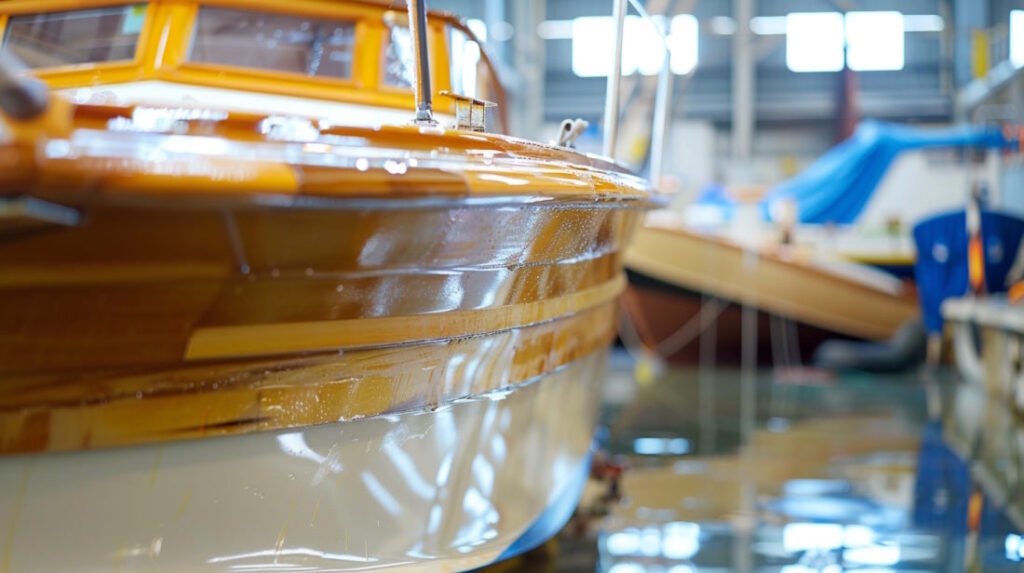Boat detailing is the process of spotless, waxing, and polishing a boat to improve its appearance and extend its lifespan. Boats, like other vehicles, are affected by the sun, saltwater, and dirt, which can damage their appearance and performance. Regular boat detailing is essential to keep your vessel looking its best and to protect it from damage.
One of the main benefits of boat detailing is that it improves the appearance of your boat. A clean and well-maintained boat not only looks more attractive but also gives off a sense of pride and professionalism. A clean and well-presented boat can make a big difference, whether you use it for personal enjoyment or business.
In addition to enhancing the appearance, boat detailing also helps to extend the lifespan of your boat. Regular cleaning and protection of surfaces can prevent the accumulation of dirt, grime, and salt deposits, which may cause corrosion and damage. Boat detailing also helps to maintain the integrity of the paintwork and gel coat, preventing fading and oxidation.
Key Takeaways
- Boat detailing is important for maintaining the appearance and value of your boat.
- DIY boat detailing can save money, but may not achieve the same level of quality as professional services.
- Professional boat detailing services can provide a range of benefits, including expertise, equipment, and time savings.
- The cost of professional boat detailing may be higher than DIY, but can be worth it for the results and convenience.
- Boat detailing services can include cleaning, waxing, polishing, and more, with special considerations for saltwater boats.
The Pros and Cons of DIY Boat Detailing
Doing boat detailing yourself can be a cost-effective option, especially if you have the time and skills required for the job. One of the advantages of DIY boat detailing is that it allows you to save money. Hiring a professional service can be expensive, especially if you require regular detailing. By doing it yourself, you can save on labor costs and invest in quality products instead.
Another advantage of DIY boat detailing is that you have control over the process. You can choose the products and techniques that work best for your boat and customize the process according to your preferences. This level of control can be particularly important if you have specific requirements or if you are particular about the products used on your boat.
However, there are also some disadvantages to consider when it comes to DIY boat detailing. One of the main drawbacks is the time and effort required. Boat detailing is a labor-intensive task that can take several hours or even days to complete, depending on the size and condition of your boat. If you have a busy schedule or limited time, DIY boat detailing may not be a practical option.
Another disadvantage of DIY boat detailing is the risk of damaging your boat. Without the proper knowledge and experience, it’s easy to make mistakes that can lead to costly repairs. Using the wrong products or techniques can cause scratches, swirl marks, or even permanent damage to the surfaces of your boat. If you are not confident in your abilities or if you have a valuable or delicate boat, it may be best to leave the job to the professionals.
Professional Boat Detailing: What to Expect
Professional boat detailing involves a comprehensive cleaning and restoration process that goes beyond what can be achieved with regular cleaning methods. When you hire a professional service, you can expect a thorough cleaning of both the interior and exterior of your boat, as well as specialized treatments to protect and enhance its appearance.
The first step in professional boat detailing is usually a thorough cleaning of the exterior surfaces. This includes washing the hull, deck, and other surfaces to remove dirt, grime, and salt deposits. The professionals will use specialized equipment and techniques to ensure a deep clean without causing any damage to the surfaces.
After the cleaning process, the next step is usually waxing and polishing. This helps to protect the surfaces from UV rays, saltwater, and other environmental factors that can cause damage over time. The professionals will apply high-quality wax and polish products using specialized tools to ensure an even and long-lasting finish.
In addition to cleaning and waxing, professional boat detailing may also include other services such as teak cleaning, canvas cleaning, engine cleaning, and upholstery cleaning. These additional services can help to restore and maintain the various components of your boat, ensuring that it looks and performs its best.
Benefits of Hiring a Professional Boat Detailing Service
While DIY boat detailing can be a viable option for some boat owners, there are several advantages to hiring a professional service. One of the main benefits is that it saves you time and effort. Boat detailing is a time-consuming task that requires attention to detail and physical labor. By hiring professionals, you can free up your time to focus on other activities while ensuring that your boat receives the care it needs.
Another advantage of hiring a professional boat detailing service is that you are likely to get better results. Professionals have the knowledge, experience, and specialized equipment required to achieve a high-quality finish. They know which products and techniques work best for different types of boats and can tailor their services to meet your specific needs.
Furthermore, professionals can identify and address issues that may not be apparent to the untrained eye. They have a keen eye for detail and can spot potential problems such as corrosion, gel coat damage, or upholstery wear. By addressing these issues early on, professionals can help prevent further damage and save you money in the long run.
The Cost of Professional Boat Detailing vs. DIY
When considering whether to hire a professional boat detailing service or do it yourself, cost is often a significant factor. While hiring a professional service may be more expensive upfront, it can be worth it in terms of time saved and quality of results.
The cost of professional boat detailing varies depending on factors such as the size of your boat, the level of cleaning required, and the location of the service provider. On average, you can expect to pay anywhere from $10 to $30 per foot for professional boat detailing services. This means that for a 30-foot boat, you could be looking at a cost of $300 to $900.
On the other hand, DIY boat detailing can be more cost-effective, especially if you already have the necessary tools and products. However, it’s important to consider the value of your time and the potential risks involved. Boat detailing is a time-consuming task that requires physical labor and attention to detail. If you have a busy schedule or limited time, hiring a professional service may be a more practical option.
Types of Boat Detailing Services Available

Boat detailing services can vary depending on the service provider and your specific needs. Some common types of boat detailing services include interior cleaning, exterior cleaning, and engine cleaning.
Interior cleaning involves a thorough cleaning of the cabin, upholstery, carpets, and other interior surfaces. This includes vacuuming, dusting, and spot cleaning to remove dirt, stains, and odors. Interior cleaning can help to improve the overall appearance and comfort of your boat.
Exterior cleaning focuses on the hull, deck, and other exterior surfaces of your boat. This includes washing, waxing, and polishing to remove dirt, grime, and salt deposits. Exterior cleaning helps to protect the surfaces from damage and maintain their appearance.
Engine cleaning is an important part of boat detailing as it helps to ensure the proper functioning of your boat’s engine. This includes cleaning the engine compartment, removing debris and dirt, and checking for any signs of damage or wear. Engine cleaning can help to prevent mechanical issues and extend the lifespan of your boat’s engine.
Boat Cleaning Services: What’s Included?
A typical boat cleaning service includes a range of tasks to ensure a thorough clean and restoration of your boat. These tasks may vary depending on the service provider and your specific needs but generally include washing, waxing, and polishing.
Washing is usually the first step in boat cleaning services. This involves using specialized equipment and products to remove dirt, grime, salt deposits, and other contaminants from the surfaces of your boat. The professionals will pay attention to detail and ensure that all areas, including hard-to-reach spots, are spotless.
After washing, the next step is usually waxing. Waxing helps to protect the surfaces of your boat from UV rays, saltwater, and other environmental factors that can cause damage over time. The professionals will apply a high-quality wax product using specialized tools to ensure an even and long-lasting finish.
Polishing is the final step in boat cleaning services. This involves using specialized compounds and tools to restore the shine and luster of the surfaces. The professionals will carefully polish the surfaces to remove any imperfections, such as scratches or swirl marks, and leave them looking smooth and glossy.
In addition to washing, waxing, and polishing, some boat cleaning services may also include additional treatments such as teak cleaning or canvas cleaning. These treatments help to restore and maintain the various components of your boat, ensuring that it looks and performs its best.
Marine Detailing: Special Considerations for Saltwater Boats
When it comes to boat detailing, saltwater boats require special considerations due to the corrosive effects of saltwater. Saltwater can cause damage to the surfaces of your boat, including the paintwork, gel coat, metal fittings, and upholstery. It’s important to take proactive measures to protect your boat from saltwater damage.
One of the main considerations for saltwater boats is regular cleaning. Salt deposits can build up on the surfaces of your boat and cause corrosion if not removed promptly. Regular washing with fresh water is essential to remove salt deposits and prevent damage. It’s also important to pay attention to hard-to-reach areas such as bilges and engine compartments where saltwater can accumulate.
Another consideration for saltwater boats is the use of protective coatings. Applying a high-quality wax or sealant can help to create a barrier between the surfaces of your boat and the saltwater. These coatings help to prevent corrosion and protect the paintwork or gel coat from fading or oxidation. It’s important to choose a product that is specifically designed for saltwater environments and to follow the manufacturer’s instructions for application.
Lastly, regular maintenance and inspections are crucial for saltwater boats. Saltwater can accelerate wear and tear on various components of your boat, including metal fittings, electrical systems, and upholstery. Regular inspections can help to identify any signs of damage or wear early on, allowing you to address the issues before they become more serious.
Common Mistakes to Avoid When Detailing Your Boat
When it comes to boat detailing, there are some common mistakes that people make that can lead to unsatisfactory results or even damage to the boat. By avoiding these mistakes, you can ensure a better result and prolong the lifespan of your boat.
One common mistake is using the wrong products or techniques. It’s important to use products that are specifically designed for boats and to follow the manufacturer’s instructions for application. Using the wrong products or techniques can cause scratches, swirl marks, or even permanent damage to the surfaces of your boat.
Another mistake is neglecting regular maintenance. Boat detailing is not a one-time task but rather an ongoing process. Regular cleaning, waxing, and maintenance are essential to keep your boat looking its best and to protect it from damage. Neglecting regular maintenance can lead to a build-up of dirt, grime, and salt deposits that can cause corrosion and other issues over time.
Lastly, rushing through the process is a common mistake when it comes to boat detailing. Boat detailing requires attention to detail and patience. Rushing through the process can result in an uneven finish or missed spots. It’s important to take your time and ensure that all areas are thoroughly cleaned and protected.
Final Thoughts: When to Call in the Experts for Boat Detailing
In conclusion, boat detailing is an important part of boat maintenance that can improve the appearance and extend the lifespan of your vessel. While DIY boat detailing can be a cost-effective option for some boat owners, there are times when it’s best to call in the professionals.
If you have the time, skills, and knowledge required for the job, DIY boat detailing can be a viable option. It allows you to save money and have control over the process. However, if you have a busy schedule, limited time, or a valuable or delicate boat, hiring a professional boat detailing service may be a more practical option. Professionals have the specialized equipment, knowledge, and experience required to achieve a high-quality finish and address any issues that may arise.
Ultimately, the decision to do boat detailing yourself or hire a professional service depends on your own situation and needs. It’s important to consider factors such as your time availability, budget, and level of expertise when making this decision. By taking the time to evaluate your options and make an informed decision, you can ensure that your boat receives the care it needs to look its best and perform its best for years to come.
If you’re considering whether to tackle a boat detailing project yourself or hire professionals, it’s important to weigh the pros and cons. While DIY can save you money, there are certain tasks that are best left to the experts. In fact, according to an article on NTD Marine Group’s website, knowing when to call in the professionals can make a significant difference in the outcome. For example, if you’re looking to winterize your boat, it’s crucial to ensure that all necessary steps are taken to protect your investment. NTD Marine Group provides valuable insights on how much it costs to winterize a boat and why it’s worth considering professional help. So before you embark on any boat maintenance project, be sure to check out their article on how much it costs to winterize a boat.
FAQs
What is professional detailing?
Professional detailing refers to the process of thoroughly cleaning and restoring a vehicle’s exterior and interior to its original condition using specialized tools, equipment, and products. It is typically performed by trained and experienced professionals who have the knowledge and expertise to handle different types of vehicles.
What is DIY detailing?
DIY detailing refers to the process of cleaning and maintaining a vehicle’s exterior and interior by oneself using household cleaning products and tools. It is a cost-effective way of keeping a vehicle clean and well-maintained, but it may not always produce the same results as professional detailing.
What are the benefits of professional detailing?
Professional detailing offers several benefits, including a more thorough and comprehensive cleaning, the use of specialized tools and products, and the expertise of trained professionals. It can also help to extend the life of a vehicle by preventing damage and wear and tear.
When should I consider professional detailing?
Professional detailing is recommended for vehicles that require a more thorough and comprehensive cleaning, such as those that have not been cleaned in a long time or those that have significant damage or wear and tear. It is also recommended for high-end or luxury vehicles that require specialized care and attention.
What are the costs of professional detailing?
The cost of professional detailing varies depending on several factors, including the type of vehicle, the level of cleaning required, and the location of the detailing service. On average, professional detailing can cost anywhere from $100 to $500 or more.
What are the risks of DIY detailing?
DIY detailing can be risky if not done properly, as it can lead to damage to the vehicle’s exterior or interior. Using the wrong products or tools can cause scratches, swirl marks, or other types of damage. Additionally, DIY detailing may not always produce the same results as professional detailing, which can be frustrating for some vehicle owners.





